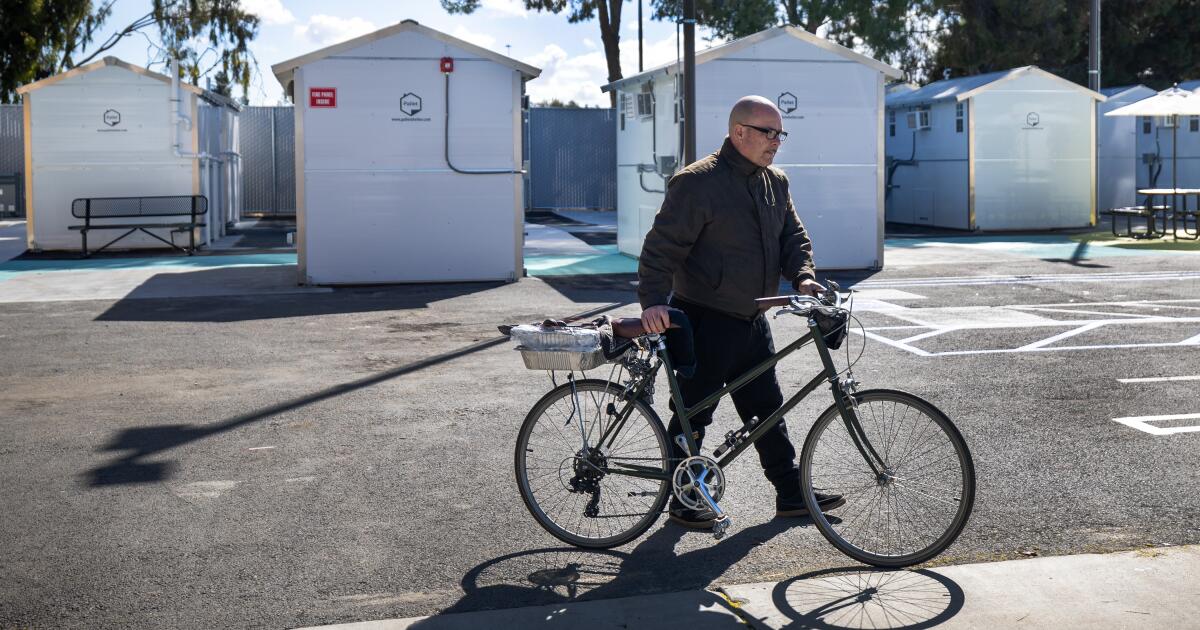Los Angeles to raise salaries at homeless shelter nonprofits

The Los Angeles City Council on Friday raised fees for services at many homeless shelters in an attempt to prevent nonprofit contractors from pulling out of more than a dozen shelters.
The council voted 12-2 to increase fees at its congregate shelters, hamlets and other facilities to $80 a night from $60 to $66. The increase is expected to begin Jan. 1 and will cover thousands of shelter beds.
The decision is expected to add $13 million in costs to this year’s budget and comes at a time when the city’s elected leaders are considering cuts to other taxpayer services. City Administrator Matt Szabo said most of the increased costs will be covered by state housing grants to open and operate new temporary homeless housing sites.
The committee’s vote follows weeks of lobbying by the Greater Los Angeles Coalition for the Homeless, which represents more than 50 nonprofit homeless service providers that provide food, safety, maintenance and other services. who. Some of the groups have warned they will stop servicing more than a dozen temporary housing sites unless the council significantly increases nightly bed rates.
Councilman Bob Blumenfield, who voted in favor of the proposal, said raising the fee to $80 would allow some of these nonprofits to “continue struggling to provide services” until July, when the larger The price increase takes effect.
“If we don’t take this action, I’m afraid we’ll see service providers shutting down their sites, which means more people on the streets,” he said.
Szabo recommended a small increase on Jan. 1 that would raise rates to $79 for small shelters (those with 50 beds or fewer) and $69 for larger shelters. He told the City Council that raising it to $80 would “drain” the city’s pool of state funds used to pay for temporary homeless housing during the current budget year.
Councilman John Lee voted against a significant increase, saying it would use up remaining funds.
“Understand that if we pass this, that’s the whole pot,” he told his colleagues.
Jerry Jones, the coalition’s director, said homeless service providers have struggled for years, in part because they didn’t receive a nightly bed fee that covered their costs. He pointed to a study that showed the true cost was an average of $139 a night — a figure Saab disputed.
On Friday, Jones described the committee’s vote as “a step in the right direction.” At the same time, he said the decision doesn’t meet the needs of nonprofits that serve homeless families at a higher cost. He said the groups are still on the verge of evacuating city-owned shelters.
“These facilities are particularly financially stretched,” he said.
Jones has repeatedly declined to name the 14 sites that are under threat of being “decommissioned” or returned to cities and counties. Three of the staff are from PATH, a nonprofit that provides services to the city.
Earlier this year, PATH executives warned board members that they were preparing to abandon three facilities – which have a combined 219 beds. On Friday, PATH CEO Jennifer Hark Dietz said the raises were not enough to secure the future of the three sites, two of which serve homeless families.
Haack Dietz said her organization is discussing other funding sources with city and county officials to keep the facilities operating for the next six months.
The committee now expects to deliver the larger increase on July 1, the start of the next budget year. Prices will reach $89 per night for large facilities and $116 per night for small facilities.
Szabo said the increase will increase city spending on homelessness by about $45 million in the 2025-26 fiscal year.
Councilor Nithya Raman, who led the push for an $80-a-night bed fee, said the changes made by the committee would bring greater oversight and accountability and more specific requirements for the types of services shelters must provide.
“It used to be that case managers only had to meet with clients once a month. That’s not casework for me. Now it’s been raised to once a week,” said Raman, who chairs the council’s homelessness committee.
Councilor Monica Rodriguez voted against the proposal, saying the council still had not received the information it requested about Mayor Karen Bass’ “internal security” plan, which Plans pay for homeless services entirely differently. Rodriguez also expressed frustration with the Los Angeles Homeless Services Authority, which is funded in part by the city and was recently the subject of a tough audit.
“We can put the word responsibility into everything and say we’re righting the ship. The problem is, even today, we still don’t have direct data,” she said.
“I cannot continue to aid and abet this broken system,” she added.
Bass spokesman Zach Seidl said in a statement that Szabo’s office regularly sends reports to Congress on the results of Internal Security. Seidel also said the decision to increase nightly bed fees will ensure the nonprofit “has the ability to help get more people off the streets.”
“We focus on solving problems,” he said. “The days of managing crises are over.”



